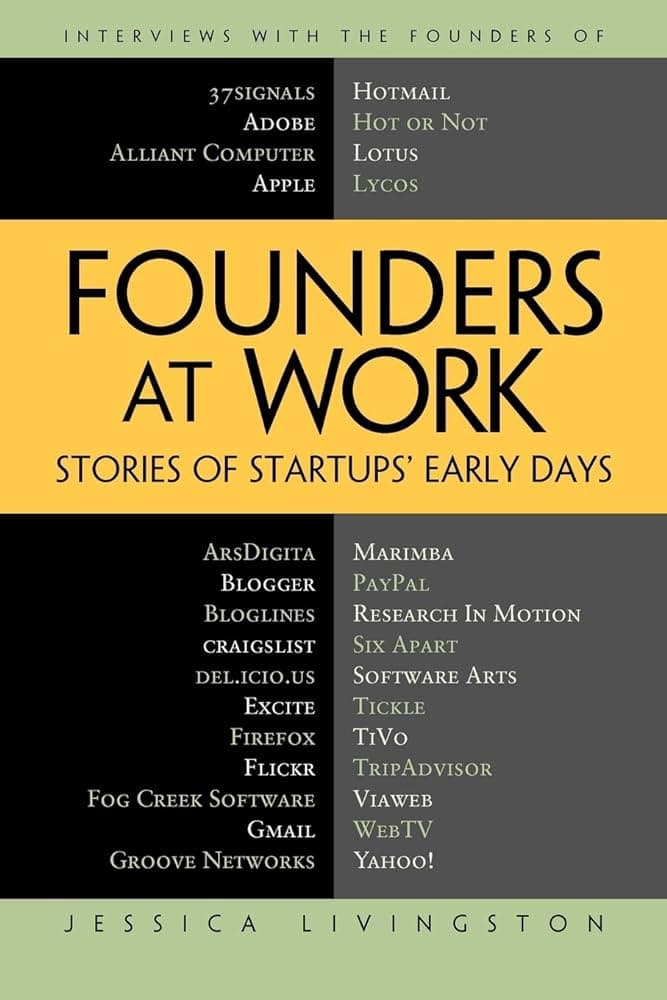Founders at work - Stories of Startups' Early Days - Summary and review

🚀 Summary: Founders at work - Stories of Startups' Early Days in 30 seconds

Contents
What is Founders at work - Stories of Startups' Early Days about
Written by Jessica Livingston, co-founder of Y-Combinator, who put together this extensive interview-based book where 32 entrepenurs tell their stories. Published in 2007, the book features many famous legends like Steve Wozniak (Apple) and Max Levchin (Paypal). A lot is centered around the dotcom-era and companies building in the beginning of the 2000s - but is it still relevant today?
Lots of interviews - very in-depth at times but some great key takeaways
The book definitely went into some pretty in-depth technical details on some parts, like Steve Wozniak telling his story about Apple. Other interviews also became rather long and non-focused, which made the book quite heavy to read at times. My suggestion is to skip those sections - skim through the non-essential stuff and find the passages that interests you. Focus on what you will get value from.
Most interviews, however, had some solid takeaways. And it was quite nice to, due to the unfiltered format, experience many founders saying similar things throught the book. You started to recognize the patterns in what their learnings were, which challenges they faced, and how they viewed the entreprenuerial journey. Below are some key learnings and reminders I think the book highlighted well.
1. Determination is king 👑
Determination is king. This was something most founders agreed on being the most valuable trait, and something they considered themselves being rather good at.
It is not who has the highest IQ, or who can come up with the coolest ideas - it is the people that can stay focused and have stamina.In order to stay determined you need to be passionated about what you do. Thus, working on a problem that you think is fun and interesting is absolutely key.
To be successful you will spend countless hours building your product, helping customers solve problems in this area, wake up and think about these problems at night.
Being that obsessed with something you are not interested in - does not make sense, if even possible.It is a rollercoaster for everyone - most founders have had dark valleys where they had to pull through, and bright peaks. Everyone can celebrate and have fun - what makes great teams win is how they cope with the tough times.
2. Pivoting is normal
Most of the founders started in one idea or business plan, and ended up somewhere else. Tripadvisor wanted to build a database to sell to other travel sites, and just ended up getting a lot of direct traffic to their dev site tripadvisor.com.
It was quite interesting to see how it is not about starting in the right idea. But rather the founders staying creative and open-minded, while staying determined to solve something in a particular area or challenge. Pivoting, either the business plan or entire idea, was a common denominator in a lot of the succesful founders’ journeys.
3. Marketing is just making a good enough product
I really enjoyed the part were Blake Ross - co-creator of Moxilla Firefox, elaborated on marketing.
“I thought marketing was something that required a degree and formal experience. It turns out that marketings is just making the product good enough that people will spread it on their own, and giving them ways to do that.”
Obviously, that is a simplification. Great products need great marketing efforts too. Working on traction and go-to-market should be a essential part of your startup. But, still it is a really good insight. The best product wins and marketing something that is inheretly inferior will just be a waste of resources. Like pouring cash into a leaky bucket.
Instead introducing viral elements and making it easy to spread an already great product - will be like spreading a wildfire. Allowing people to do what they are already inclined to do - tell all their friends about this awesome product they discovered. That is what product-led growth is about.
4. Startups are painful
Starting a company is not easy. Selling a product that is never fully complete is hard. Being in a constant working state - waking up at night and obsessing about problems is hard. Having to deal with new situations everyday is challenging. The startup world is often romantized and all you see in the press is funding announcements, big exits and fancy valuations. It is not for everyone. It is painful.
But at the same time it is also the best experience in the world. You grow and learn a ton. Probably the best sand box for personal development in the world. And the highs are really high. You get to work on big problems and get so much leverage out of your own creativity. You can make your own path, implement stuff right away, see customers get value from your solution and really make an impact. But, remember - not without a lot of pain.
5. Time is gold
Each meeting is valuable time you could have done other things. Spend your time like it is gold. Do you really need to meet another VC? Can you condense that 1h meeting into 30 minutes? Stay focused. Build your product and talk to users.
Buy the book: Founders at work - Stories of Startups' Early Days 👇
If curious in more, you can buy the full book on Amazon: Print | KindleFounders at work - Stories of Startups' Early Days review - what kind of book is it?
My favorite interview was probably with Philip Greenspun, founder of the web development company ArsDigita - with lots of interesting learnings, drama and entertaining stories from bringing on external capital, etc. Also, it was a fun ending of the book - hearing about Jessica's own story with the legendary Y Combinator, and how that all got started. Overall, the book really offered a variety of personalities and stories, but with a lot of common elements in their journeys to success. I think that was the best part of the book. The fact that you got this raw material that you could process on your own, and make your own patterns and findings from. Most startups in the book were founded in the dot-com era, in a totally different time than today. Both considering where funding is at, but also the competitive landscape for Internet-based companies, with that infrastructure having been around for many decades now. However, I think the founders and their stories are still really relevant. People do not change. I would recommend to skim through the more techy or in-depth parts, if you are not especially interested in that stuff. But all in all - an excellent night time read!
Frequently asked questions (FAQs)
Want to learn more about growing SaaS companies?

